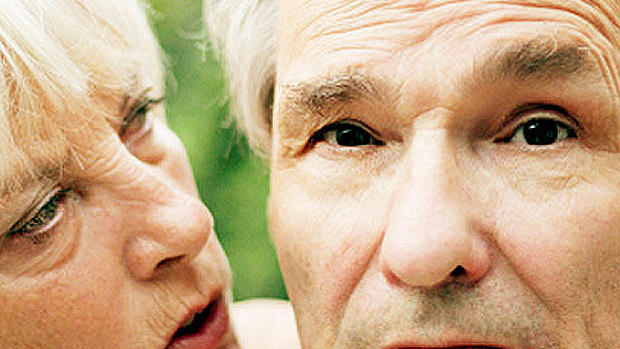Slowed walking speed may be early predictor of Alzheimer's decline
(CBS News) New research suggests how a person walks may predict whether they'll develop Alzheimer's disease, a degenerative, incurable brain disease that affects 5.4 million Americans.
Four new studies presented at the Alzheimer's Association International Conference in Vancouver, Canada, tied walking ability to memory and cognitive decline, and may one day help doctors diagnose the disease earlier, researchers say.
Alzheimer's disease: 7 things that raise your risk
For the first study, which spanned from 2007 to 2011, scientists tracked 1,153 participants from Switzerland (average age of 77). They included people from outpatient clinics treated for memory and mobility problems as well as cognitively healthy individuals.
Participants were divided into three groups based on their baseline cognitive diagnoses: those who were cognitively healthy, those who had mild cognitive impairment (MCI) - a condition that indicates the stage between normal forgetfulness and the development of dementia - or those who had Alzheimer's disease.
After testing for "normal walking" and two "dual task" tests which included walking while counting backwards or naming animals, the researchers found that how fast a person walked - or gait speed - slowed as cognitive problems progressed. Patients with Alzheimer's walked slower than those with MCI, who walked slower than healthy people. For all groups, walking speeds were slower during the dual testing phase than for the normal walking test.
"Mobility impairments are often associated with dementia, and some gait changes may even appear before cognitive decline can be detected by traditional testing methods," study author Dr. Stephanie A. Bridenbaugh, a researcher at the Basel Mobility Center in Switzerland, said in a press release. "When problems emerge, this may provide early detection of fall risk and the earliest stages of cognitive impairment in older adults"
Bridenbaugh said an analysis of a patient's gait won't replace a comprehensive neurological exam for diagnosing Alzheimer's, but it may be a helpful tool for detecting disease progression.
The second study presented, titled the Mayo Clinic Study of Aging, measured stride length, cadence and speed of walking in 1,341 participants using a computerized tracking tool at two or more appointments spaced 15 months apart. More than 1,170 of the patients had normal cognitive function, with 158 diagnosed with MCI and 11 having dementia. The researchers found slower walkers with a lower cadence and less of a stride length were more likely to have problems in cognitive, memory and other processing functions, compared to faster walking counterparts.
The third study found that how a person walks in the home may predict cognitive decline. It looked at 19 dementia-free people who underwent MRI scans to measure the volume of certain portions of their brains. Participants were also tested for walking speed at the doctor's office before undergoing an MRI and then at home, using motion sensors that collected walking data over the course of a month.
The researchers found slower walking speeds in the home were associated with smaller brain size, and more associated with less volume in the hippocampus - an area essential for memory processing. Researchers could not find a similar affect for the single walking test taken before their MRI scans, which suggests how a person walks at home may be a better indicator of cognitive problems.
"Walking speed taken at a single time point may over-estimate walking abilities in the elderly," said study author Dr. Lisa Silbert, a researcher at Oregon Health & Science University at Portland. "Our data suggests that continuous in-home monitoring may provide a more accurate reflection of walking speed and may be more sensitive at detecting motor changes associated with future cognitive decline," she said.
The last of the studies, from researchers at Tohoku University Graduate School of Medicine in Sendai, Japan, measured the connection between gait and cognition in 525 people over 75 who did not live in assisted living or nursing homes. The researchers identified 385 participants with a normal gait, 73 who had an abnormal gait due to bone or joint disease, and 65 people who had a so-called "neurological gait." Further anaylsis revealed that gait speed was significantly decreased as a person's symptoms of dementia increased, similar findings to the other presented studies.
"Gait should no longer be considered a simple, automatic, motor activity that is independent of cognition," said study author Kenichi Meguro of Tohoku University. "They are linked."
Dr. William Thies, chief medical and scientific officer for the Alzheimer's Association, summarized the research saying, "With an aging baby boomer generation advancing into greater risk for Alzheimer's and dementia, it is important for physicians to be aware of the associations between gait and mental function. These studies suggest that observing and measuring gait changes could be a valuable tool for signaling the need for further cognitive evaluation."


